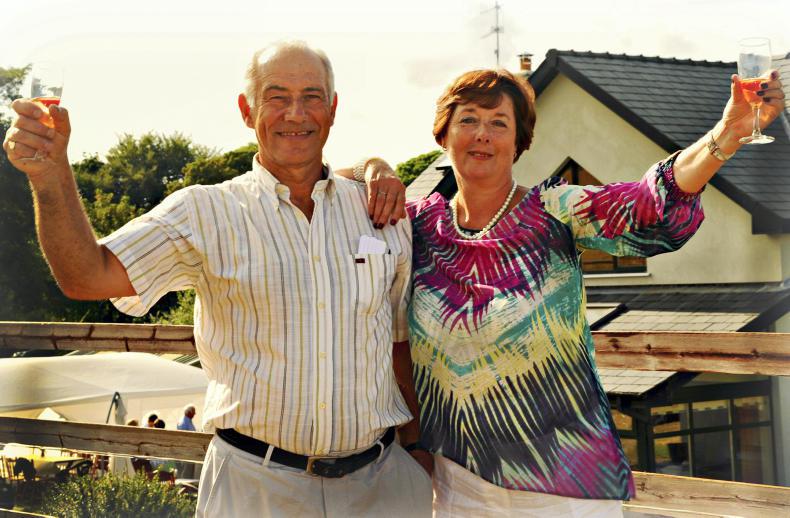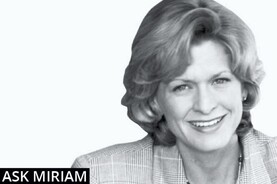You’re in a place you don’t want to be but there’s no use in getting down about it. You just have to knuckle in, find your options and try to motor on.”
That is retired Cork tillage and suckler farmer Alex Hosford’s attitude to the challenges of life and his philosophy on life since his diagnosis with a blood cancer called multiple myeloma.
Alex Hosford mentions the ‘we’ word pretty soon after the interview begins. While he was the person diagnosed with multiple myeloma in September 2015 after he had been feeling unwell all summer, once he starts talking about treatment and recovery he broadens the pronoun out quickly and consistently to ‘we’. “We did our administration of the drip at home… We had a very good stem cell harvest… We were very sick that evening…”
It affects everyone when one person in the family is ill. We were all in it together
When this is pointed out he has an answer.
“It’s because this is a family illness,” he says. “It affects everyone when one person in the family is ill. We were all in it together. From the beginning I was conscious of the impact my diagnosis was having on my wife Eleanor and our children.
"To see the shock and distress on their faces makes you determined to get better. I felt that I had to get better to ease the pressure on the family.”
Thanks to what he calls his hospital team and his home team, Alex is doing well. Two years on from a stem cell transplant (formerly called a bone marrow transplant) he now only attends hospital for a day a month but has to be careful to avoid infection.
“Infection is my big issue,” he says. “We would be a bit careful, avoiding crowded places and people with colds and that. It’s all part of doing the best you can to mind yourself. That’s what it’s about now.”
Alex had the offer of trying Cancer Trials Ireland (CTI) drugs straight away.
“There was no thinking about it. We were always forward-thinking on the farm, taking part in various tests and trials over the years and using technology. With that culture and mindset there was no hesitation.”
As much as possible of Alex’s treatment took place at home. Needing antibiotics for six weeks after diagnosis to clear the sepsis in his system before chemotherapy, he had the antibiotic drip at home for four of those weeks.
“It was an efficient system. While Eleanor had to become a nurse overnight really the administration of the antibiotics was easier than in hospital because we could set it up and then put it into a pocket and I could go downstairs to look at television.”
Familiarity with injections as a farmer meant that doing this didn’t freak them out but never having been in hospital in his life before was a serious shock.
“I was always active and in reasonable shape so this illness was a fair shock to the system but you just have to knuckle in, find your options and try to motor on,” he says.
Motoring on has meant the stem cell transplant.
This is a procedure that replaces unhealthy blood-forming cells with healthy cells. In Alex’s case the healthy stem cells came from his own bone marrow.
They were ‘harvested’ – collected and saved – following intense chemotherapy.
Again, before the transplant was done, two months later, Alex received a high dose of chemotherapy to destroy diseased cells before the healthy stem cells were returned to his system where they could produce new blood and immune cells and replace the cells destroyed by the treatment.
The stem cell preparation is infused into a vein and, once in the bloodstream, the stem cells migrate to the bone marrow space.
“It’s a bit like dialysis with your blood being put through a machine. You get the hormone treatment and a big blast of chemo and the ‘harvesting’ takes place over three or four days.”
While Alex’s positivity enables him to make light of what he went through, he says: “We did find it very difficult.”
He finds it ironic that the terms used were tillage farming ones – harvesting, yield, quality… “These were words I’d used all my life.”
While the transplant after another ‘blast of chemo’ was very difficult – there are heart attack and stroke risks with the treatment - it wasn’t quite as stressful as the harvesting, he says, but it meant an isolation ward for weeks because he had ‘nil immune system’ at that point.
With the help of his wife, Eleanor, and his daughter, Sandie, a physiotherapist who “understood the medical world and coached him through the transplant process”, Alex got home quickly.
Slowly he regained his strength as his immune system started to work again and by summer time he had built up his walking times.
Although peripheral neuropathy caused by chemotherapy (tingling and numbness in the feet) continued and is still an issue, by September Alex could begin to get involved once again with the storage business he and his wife run in their yard.
“Bar an odd hiccup – I’ve been in hospital twice since with infections – I’m doing well.
I would take my temperature every day as temperature rising is a sign of infection. If there’s infection it has to be dealt with fast.”
Inside track and helping others
Alex is very glad that he took part in a cancer drug trial.
“In the first place you’re on the inside track and you know you are going to get more care and attention.
"The care and attention we had was unbelievable. Secondly, by taking part you’re adding to the knowledge about drugs and treatment and that’s helping others down the road.”
The Hosfords regularly attend CTI conferences and continue to be amazed by what doctors and research can do.
“We are very comforted by knowing that if the drug you’re on packs in, there are others that can be tried. That means a lot.”
Alex considers himself a changed person since his diagnosis.
Alex is a very good patient and a very positive man. He has said all the way through that his one aim was to get better for the team at home
“I was always a positive thinker and I believe that positivity in you brings positivity out of people – and I’ve found that in a few medical situations – but I’d also believe now in people talking about what’s wrong. This business of not talking about things is not good.”
While Alex admits that, over two years on, he is ‘operating at a gear or two lower’ than he used to, he is still out and about and able to keep an eye on things.
Eleanor's experience
Eleanor Hosford understands the ‘we’ word. “The family goes through the illness. Alex is a very good patient and a very positive man. He has said all the way through that his one aim was to get better for the team at home.”
While the treatment process had the occasional stress – one abrupt doctor, a night on a trolley when starting the stem cell harvesting process and one less-than-satisfactory ambulance transfer – overall she speaks highly of the care Alex has had in both Cork University Hospital and in University Hospital Galway.
“He’s doing his best now to survive and it’s all about how he minds himself. He knew nothing about medical matters before this started but he has become very knowledgeable and isn’t afraid to talk to people about his experience.”
Arc House helping to cope
It’s been a long road but you can turn a bad situation into a good one, she says.
“I’ve learned a lot about coping from Arc House. A group of survivors and family members meet there once a week.
"We have counselling and yoga and I’ve learned how to meditate.
"That has been very useful in coping with Alex having cancer and what I’ve learned I try to pass on.
"You are taught to accept where you are right now. Some people there are cancer survivors but they don’t go on about it.
"It’s not a room of doom and gloom – we have a laugh. Even during Alex’s chemo – which he had at home with the help of a nurse – we could make a joke of things.
"Instead of calling him in for his tea I’d be saying: ‘You’ve to come in for your chemo’.
"It’s not something you’d ever think you’d be saying but you have to try make light of it as a coping mechanism.”
Eleanor admits that the whole experience of Alex’s illness has been a shock and she pays tribute to their children, Nigel, Philip, Mark and Sandie who all supported them in their own ways.
Sandie’s experience as a physiotherapist was particularly helpful during the transplant times.
“She was there with her Dad, helping him to control his breathing which is very important during the procedure.
Stem cell harvesting and transplant done by drip sounds simple but it’s anything but. It was a very tense time for everyone and then Alex was so sick physically after the chemo and the transplant.”
With nearly two years gone since then, the Hosfords who are grandparents to 10 children, consider themselves lucky and are concentrating on the success stories around the illness and on taking each day as it comes.
“None of us know what’s round the corner,” Alex says, “but you have to get on with it.”






 This is a subscriber-only article
This is a subscriber-only article









SHARING OPTIONS: